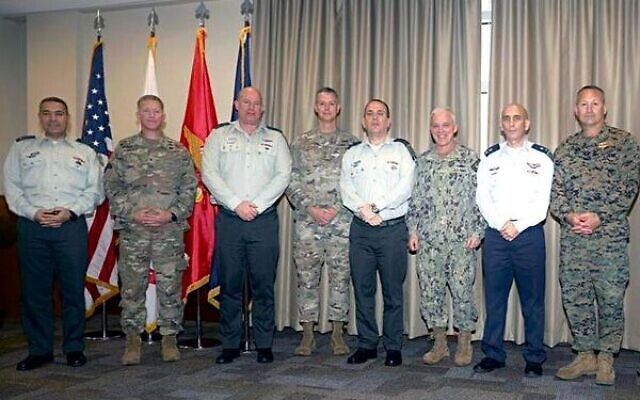- 2021 updates to CENTCOM regulations regarding vacation travel prevent participation in Birthright, holidays in Israel; spokeswoman insists changes entirely COVID-related
Men and women serving in the US Armed Forces are restricted from traveling on leave to countries in the United States Central Command Area of Responsibility (AOR), which includes Israel, The Times of Israel has learned.
On September 8, 2021, exactly one week after Israel was officially moved into CENTCOM’s AOR, the Command published updates to its guidance on travel, signed by Chief of Staff Major General Patrick D. Frank. The revised Central Command Regulation 55-2 states that “unofficial travel into the USCENTCOM AOR is not authorized.”
According to the previous iteration of the document from June 9, 2020, unofficial travel — which includes leave — to countries in the AOR needed only permission from the first O-6 in the applicant’s chain of command. An O-6 is a captain in the US Navy and a colonel in the other branches of the US military.
Approval was almost always granted.
Under the new restrictive guidance, servicemen and women do have the option of appealing for emergency approval from their component commanders, senior flag officers at the rank of general and admiral. However, that process is highly unlikely to be approved. Requests must be made 30 days in advance, a requirement that flies in the face of most emergency circumstances. Get The Times of Israel’s Daily Edition by email and never miss our top stories Newsletter email address By signing up, you agree to the terms
There is the possibility of providing written justification for last-minute requests. But even if the necessary commander approves the appeal, the CENTCOM Theater Travel Coordination Cell, generally civilian employees who do not know the soldiers, can override that approval. Senior Israel Defense Forces officers (in white) meet with top officials in the US military’s Central Command in Tampa, Florida, on December 1, 2021. (Israel Defense Forces)
Senior Israel Defense Forces officers (in white) meet with top officials in the US military’s Central Command in Tampa, Florida, on December 1, 2021. (Israel Defense Forces)
In the 2020 version, travel only to Afghanistan, Iran, Iraq, Syria, or Yemen was listed as “not authorized,” clearly a security precaution. Since the 2021 updates, however, relatively safe and stable US allies like the UAE and Israel are listed in the same way.
The restrictions do not only affect visiting troops. They also apply to the dozens of US reservists living or studying in Israel, who are on assignment elsewhere and wish to return to their homes and families. Currently, four reservist US military chaplains call Israel their home.
Though the updated 55-2 was published shortly after Israel was moved into the CENTCOM AOR — Israel’s inclusion was among the three revisions listed at the top of the document — CENTCOM stressed that the reason for new regulations had to do with COVID-19 and nothing else.
“The changes… to Central Command Regulation (CCR) 55-2, were implemented in direct response to heightened COVID-19 restrictions throughout our area of responsibility,” Lieutenant Colonel Karen Roxberry, CENTCOM’s chief of media operations, told The Times of Israel in an email.
“Any correlation between the Defense Department’s announcement of Israel’s realignment to US Central Command’s responsibility in September 2021 is purely coincidental,” Roxberry emphasized.
She added that the changes came directly from CENTCOM’s leadership.
COVID questions
The COVID-19 explanation raises further question marks. The CENTCOM AOR has not been a leading coronavirus hotspot, certainly not compared to Europe, the Asia-Pacific region, and North America.
According To The New York Times and others, on the day the new 55-2 regulations came out, 15 countries — primarily in Europe and the Americas — had more active cases than Iran, the country in CENTCOM’s AOR with the most cases. Israel, the country under CENTCOM with the second-most cases, was number 26 on the list. An Israeli receives a COVID-19 vaccine injection, at a Clalit vaccination center in Jerusalem, on March 8, 2021. (Yonatan Sindel/Flash90)
An Israeli receives a COVID-19 vaccine injection, at a Clalit vaccination center in Jerusalem, on March 8, 2021. (Yonatan Sindel/Flash90)
The situation is similar today, eight months later. According to Johns Hopkins University, Israel is the top country in CENTCOM’s AOR in terms of COVID cases over the past four weeks. It is number 24 on the list, well behind countries across the Western world and Asia.
Yet, the other US regional combatant commands, including European Command and Indo-Pacific Command, did not issue similar restrictions on leave travel in response to the pandemic. “EUCOM leaders did not issue regulations in 2020 or 2021 specifically regarding non-duty travel within the AOR,” said Chuck Prichard of EUCOM’s Public Affairs office.
Moreover, though the Middle East did briefly become a relative COVID-19 hotspot a year ago, it has not been one for many months, and is one of the least problematic areas of the world today. Still, there has been no update to the restrictions on travel.
In addition, the measures are far from temporary, and are currently slated to expire in 2026. CENTCOM regulations are normally reviewed every two years, and there are no plans to revisit the travel guidelines, according to Roxberry.
Finally, the 2020 version of 55-2 came out when the pandemic was in full force. There were over 7 million active cases globally when it came out on June 9, yet it did not include strict limits on travel to the region Then-commander of US CENTCOM Kenneth McKenzie (right) is seen with Maj. Gen. Hidai Zilberman, Israel’s defense attaché to the United States, after landing in Israel, March 2, 2022 (IDF)
Then-commander of US CENTCOM Kenneth McKenzie (right) is seen with Maj. Gen. Hidai Zilberman, Israel’s defense attaché to the United States, after landing in Israel, March 2, 2022 (IDF)
For decades, Israel was in EUCOM’s area of responsibility in order to prevent possible tensions between CENTCOM and the Arab and Muslim nations under its purview. In recent years, however, CENTCOM’s allies have increasingly developed relations with Israel, some informally, so those issues have largely faded.
Five days before he left office in January 2021, US president Donald Trump ordered that CENTCOM include Israel. Though partially a symbolic move, including Israel in CENTCOM was expected to improve the direct communications between the IDF and American troops in the region and, through the US, other militaries in the AOR.
CENTCOM’s AOR covers Afghanistan, Bahrain, Egypt, Iran, Iraq, Israel, Jordan, Kazakhstan, Kuwait, Kyrgyzstan, Lebanon, Oman, Pakistan, Qatar, Saudi Arabia, Syria, Tajikistan, Turkmenistan, United Arab Emirates, Uzbekistan, and Yemen.
Perfect storm
Rabbi Irving Elson, director of the Jewish Welfare Board, which certifies and endorses rabbis as military chaplains, said he “is convinced” that COVID is part of the reason for the restrictions.
“It’s kind of hard to figure out why there was a change,” acknowledged Elson, who served as a chaplain in the Navy and Marine Corps for 35 years.
“I am also convinced that CENTCOM is not acting out of anti-Israel sentiment, and certainly not antisemitism, in any way whatsoever,” he stressed. “I’ve been doing this a long time, and I think I’m pretty good at smoking out when it’s an anti-Israel, antisemitic thing, and when it’s something else. This is something else.”
He attributed the changes to a “perfect storm” of COVID, regional developments, and the recent start of the relationship between CENTCOM and Israel.
“I think there’s an education process here,” he said. “CENTCOM is just getting to know Israel.”
The JWB Jewish Chaplains Council is working with CENTCOM’s chaplaincy to explain the need Jewish soldiers and officers have to travel to Israel. That process is being held up somewhat by the fact that a new CENTCOM chaplain assumed his post last week and needs some time to settle into the position.
I am convinced that CENTCOM is not acting out of anti-Israel sentiment, and certainly not antisemitism, in any way whatsoever
“We also have to recognize that there’s a lot that we don’t know that they know, and we have to work with them and recognize that they have information that we might not have,” Elson explained.
Birthright on pause
One of the most visible impacts of the updated CCR 55-2 is on Birthright.
There are usually winter break Birthright trips to Israel every other year for Jewish cadets at service academies and students participating in Reserve Officers’ Training Corps at other schools. Because of COVID, the last trip took place in early 2020. Participants celebrate Taglit-Birthright Israel’s 15th anniversary, Tel Aviv, June 2015. (Courtesy)
Participants celebrate Taglit-Birthright Israel’s 15th anniversary, Tel Aviv, June 2015. (Courtesy)
There are currently no such Birthright trips planned, according to Israel Outdoors, the provider that organizes the cadet programs.
The trips, designed to give young Jews (mostly Americans) a crash course in Israeli history and culture in the hopes of convincing them to remain involved in Jewish life and pro-Israel causes, are offered to any Jewish young adult aged 18 and up who has never been to Israel, or whose previous trip to Israel lasted less than three months.
“Are there servicemembers who are pissed off because they can’t go on Birthright? Yeah, there are. But we are working on it, we’ll get it fixed,” promised Elson.
“If you think about everything going on in the world, it’s not high on the priority list of CENTCOM. It’s not a huge deal. It’s a matter of bringing awareness to the Command office.”





